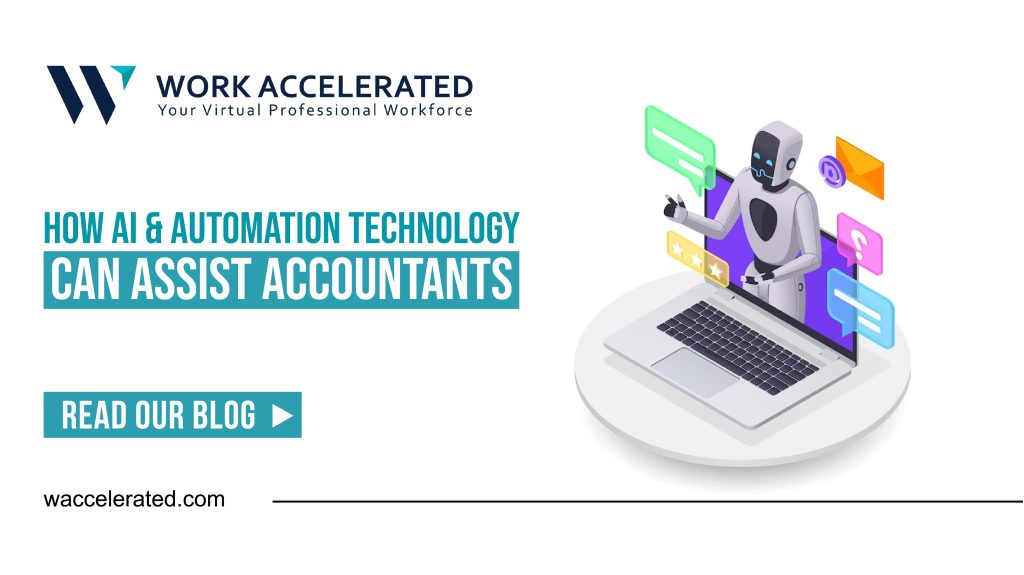How AI and Automation Technology Can Assist Accountants
Artificial intelligence (AI) is rapidly transforming the accounting industry. It is automating tasks like bookkeeping and inventory management, providing insights, and helping SME owners make better financial decisions.
Because many of the jobs previously done by humans can now be automated, AI has the potential to replace specific jobs in the accounting industry. SME owners are already finding it challenging to hire full time resources for traditional services such as data entry or audits amid the surging inflation.
AI and automation may change accountant job functions. The need for accountants will not disappear. However, their job functions will likely evolve. For example, a traditional bookkeeper will become more of an information systems manager — someone who helps clients feel in control of their data and cash flow management.
AI may be a good substitute for repetitive accounting jobs, but the executive level financial tasks may be better left to the professionals. On that note, following are some specific ways in which AI can assist accountants:
Data Automation and Entry
AI can automate repetitive data entry tasks which might require no regular interference, such as bookkeeping, recording information from invoices, receipts, and other financial documents. This can help accountants to get more free time and utilize more complex and strategic activities.
Financial Reporting and Analysis
AI can also generate financial reports, analyze financial trends, and identify anomalies or potential fraud. This can help accountants gain access to more accurate and timely financial information which can help them provide informed financial insight to the SME owners.
Tax Compliance and Planning
AI can also evaluate tax regulations, identify potential deductions and credits, and prepare tax returns. This can help accountants ensure compliance and that SME owners stay updated with tax regulations of their country.
Audit and Fraud Detection
AI can analyze complex sets of financial data to identify patterns and anomalies that may indicate scam or errors. This can help SME owners prepare for risk mitigation strategies and prevent financial follies.
Risk Management and Forecasting
AI can also analyze the historical financial data, current trends, and industry conditions to assess financial risks and forecast future performance. This help can help accountants make informed decisions about where to invest business resources and prepare for potential financial challenges.
Personalized Client Advisory
AI can analyze client data and preferences to provide personalized financial advice and suggestions. This way accountants can help SME owners build sustainable relationships with clients which can enhance their overall experience and turn them into returning customers.
Continuous Learning and Development
AI can provide accountants with personalized learning recommendations and help them stay up-to-date with the latest accounting standards, regulations, and software. This can help accountants maintain their expertise and relevance in the continuous evolving accounting landscape.
Regulatory Compliance and Reporting
AI can monitor regulatory changes, identify compliance requirements, and generate reports to demonstrate compliance. This helps businesses avoid penalties and maintain a positive reputation.
Contract Review and Management
AI can also evaluate contracts, identify key terms and conditions, and extract required information. This can help accountants regulate contract review processes and ensure compliance.
Internal Control and Process Improvement
AI can also identify areas for financial strategies improvement, automate internal controls, and monitor compliance with internal policies. This can help SME owners enhance business efficiency, reduce potential financial risks, and improve overall financial management.
The integration of AI in accounting is still in its early stages, but the potential benefits it offers to accountants cannot be ignored. AI is continuously revolutionizing the accounting profession, making it more efficient, insightful, and value-driven.
AI may also prompt new accountant specialties. If AI and automation take over operational tasks, accountants with value time can find ways to add more value in other financial departments. For instance, by offering more informed financial consulting, accountants can continue to improve their bookkeeping accuracy and accessibility while expanding their service area that they offer to clients.
AI and automation can also provide new insights for accountants that they might miss. Many cloud-based accounting platforms are moving beyond transaction automation toward analysis. As a result, machine learning can give many accounting professionals detailed insight about their clients’ which accountants can use to provide expert advice.
AI and automation may prompt accountants to be more proactive. While AI works on data entry and organization, accountants are supposed to seek out advanced business endeavors. For example, they can ensure that their clients are ready for significant financial transactions, such as initial public offerings, mergers and acquisitions, business loans, strategic reviews, or restructuring.
Accountants often navigate these transactions in real time. However, AI can help them benchmark, track and improve clients’ businesses before a transaction starts.
Work Accelerated: Your Gateway to Highly-Skilled Outsourced Accounting Resources

Among other options, SME owners can also rely on Work Accelerated to hire outsourcing resources and streamline non-core processes, having enough time and investment to make informed business decisions. Hiring these external accounting experts from bookkeepers to CFOs who can focus on non-core areas of your firm, just like AI, can help your business make a breakthrough in the industry since you will have time and more investment for the development and strategic planning of your company’s growth.

